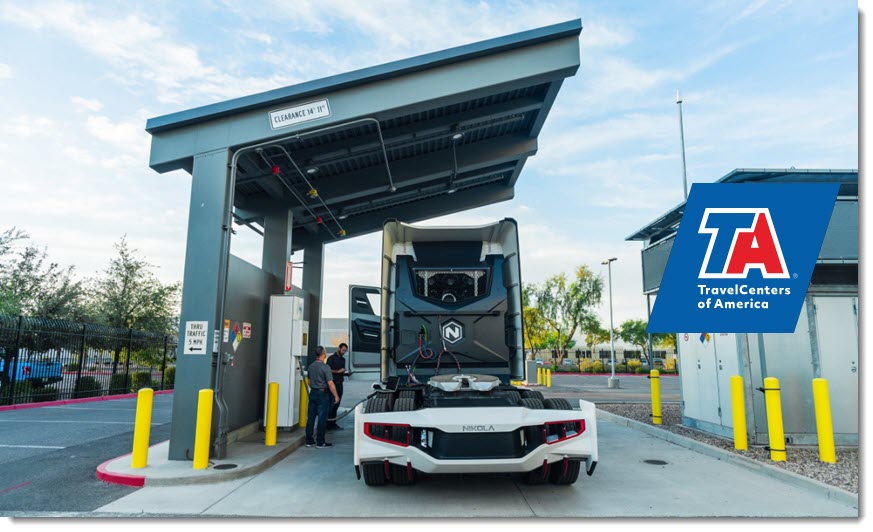
The expansion of America’s electric charging infrastructure has been essential for the widespread adoption of electric cars. Now, zero-emissions vehicle manufacturer Nikola has a new plan to create the same support infrastructure for hydrogen-powered machines — and especially the fuel cell trucks the company plans to manufacture.
In April, the company announced a limited collaboration on hydrogen fuel stations with truck stop company TravelCenters. If successful, Nikola may use the pilot project as a springboard for a nationwide network.
Details of the Plan
The company’s plan starts small, with two hydrogen fueling stations at California truck stops managed by TravelCenter, the largest travel center company in the United States. The two stations are slated to become operational in the first quarter of 2023.
Both stations will provide an open fueling network available to any truck customer. They will also follow industry standards for heavy-duty fueling protocols, ensuring that any hydrogen truck customer can use these stations.
If the limited collaboration is successful, Nikola hopes to significantly expand the number of hydrogen fuel stations available to more than 700 across the U.S. and Canada by 2028. These stations, which need around 10 acres of land each, would include filling pumps and a building housing hydrogen production equipment and storage tanks.
Each station would store and dispense up to 10 tons of hydrogen, equivalent in energy to more than 7,000 gallons of diesel fuel. They would be leased from existing truck-park facilities, warehouses and travel centers.
The plan would complement Nikola’s line of hydrogen cell-powered semitrucks, which will become commercially available in 2022. The company said there’s been notable interest in these trucks — with more than 14,000 advance orders booked so far. However, this kind of demand doesn’t represent significant attention from the trucking industry at large.
Many logistics companies may be waiting for the emergence of national hydrogen power infrastructure before committing to hydrogen cell trucks.
What Could Hydrogen Fuel Do for America?
Electric semitrucks are becoming increasingly viable due to advances in technology like spectral solutions that have enabled more advanced battery technology. However, there are still significant drawbacks to EVs that have made major logistics companies hesitant.
Many modern electric trucks have a limited range compared to diesel and may only be suitable for local delivery. The lack of a dedicated electric power infrastructure for commercial vehicles like semis has discouraged companies that may want to avoid electrifying their delivery fleet until EV technology and infrastructure improve.
Hydrogen fuel cell semitrucks, which have a range comparable to diesel-powered trucks, would provide a clean and reliable alternative to diesel fuel and complement EVs. This could help the logistics industry significantly reduce its carbon footprint.
If Nikola’s plan is successful, it could mitigate some of the most serious drawbacks of hydrogen fuel cells. This includes limited availability of fuel and the lack of national infrastructure.
The logistics industry is one of the nation’s largest polluters, and a significant portion of emissions it generates comes from semitrucks burning fossil fuels. Along with electric vehicles, hydrogen trucks could make travel significantly more eco-friendly and simplify the path to zero-emissions goals that may otherwise be difficult for states and major organizations to reach.
Nikola May Lay the Foundation for Hydrogen Fuel in America
Nikola’s plan for hydrogen fuel stations, along with the development of industry standards on fueling, could lay the groundwork for hydrogen infrastructure in the U.S. The company has already received several offers for its forthcoming line of hydrogen fuel-powered semitrucks — a sign that, with better infrastructure, the trucking industry may be ready to pivot away from diesel vehicles.
Over the next few years, initiatives like Nikola’s collaboration with TravelCenter may help enable a shift away from fossil fuels and toward zero-emissions goals.


Jane Marsh
Jane Marsh is the Editor-in-Chief of Environment.co. Jane covers topics related to climate policy, sustainability, green technology, renewable energy and more.
Read the most up to date Fuel Cell and Hydrogen Industry news at FuelCellsWorks




